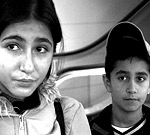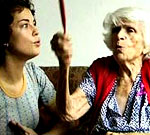friends
Films by directors who will enter the festival on a ‘friendly basis’. They can be friends of the members of the programme board or friends of invited filmmakers and film experts.
friends section programme

» THE MALADY OF DEATH
(La maladie de la mort), Asa Mader, France/USA, 2003, 38′
Intimate film essay about a man and a woman, about love and death.
- D,S: Asa Mader, Sylvie Toux (based on a novel by Marguerite Duras)
- C: Michel Naeziger, Asa Mader
- M: Biosphere, Michael Galasso
- E: Asa Mader, Wataru Kitano, Sylvie Toux
- SO: Asa Mader, David Cook
- P: Nicolas Lhermitte (Hush Production)
- CA: Anna Mouglalis, Stephan Crasneanski
- selected by Helmut Groschup, chief manager of the partner Innsbruck international film festival
Based on La Maladie de la mort by Marguerite Duras: A man hires a woman. Perhaps for several days, perhaps several weeks. She would be young. She would be beautiful. She could be any woman. She would come each day, each night. And in his attempt to try, to know her, she uncovers for him the malady that he has been taken by. The malady of death.
Based on La Maladie de la mort by Marguerite Duras: A man hires a woman. Perhaps for several days, perhaps several weeks. She would be young. She would be beautiful. She could be any woman. She would come each day, each night. And in his attempt to try, to know her, she uncovers for him the malady that he has been taken by. The malady of death. (Asa Mader)
Festivals, awards (selection): Venice 2003, Kerala (India) 2003, Angers 2004.

» ACCORDION TRIBE
(Accordion tribe), Stefan Schwietert, Switzerland/Austria, 2003, 87′
An intimate and intense documentary about the merging power of music.
- D,S: Stefan Schwietert
- C: Wolfgang Lehner
- E: Stephan Krumbiegel
- SO: Dieter Meyer
- M: Accordion Tribe
- P: Cornelia Seitler, Brigitte Hofer (maximage)
- PR: Guy Klucevsek, Lars Hollmer, Maria Kalaniemi, Bratko Bibic, Otto Lechner
- selected by Christibne Dolhoffer, chief manager of Crossing Europe film festival
Five of the world’s most innovative contemporary accordionists from different countries formed the Accordion Tribe in May, 1996. The group of composers and performers of music for accordion, featuring solo and ensemble playing for 4 piano accordions and one chromatic button accordion, went on the European tour and took breath of those, who said that accordion is not considered a classical intrument, as well as of all modern music enthusiasts lucky enough to witness it. Maria Kalaniemi from Finland, Bratko Bibic from Slovenia, Guy Klucevsek, an American of Slovene origin, Lars Hollmer from Sweden and the Austrian Otto Lechner, each of these musicians is recognized in music circles as being not only technically skilled but having profound compositional ability as well as being driven by a deep passion for breaking down musical barriers. Their performance is a patchwork of classical, jazz, folk or avant-garde music.
When I play, my instrument and body become one. Accordion becomes my lungs. (Maria Kalaniemi)
Festivals, awards (selection): Diagonale 2004, Visions du reel - Nyon 2004, Crossing Europe 2004.

» SOUND OF BRASIL
(Moro no Brasil), Mika Kaurismäki, Germany/Brasil/Finnland , 2002, 105′
Mika in the jungle of Brasilia’s music.
- D: Mika Kaurismäki
- S: Mika Kaurismäki, George Moura
- C: Jacques Cheuiche
- E: Karen Harley
- SO: Uwe Dresch, Robert Faus, Cristiano Maciel
- P: Phoebe Clarke
- PR: Grupo Fleetwtxya, Children Fulni-Ă´, Grupo Fethxa, Setka, Band Fulni-Ă´, Tavares da Gaita, Joao do PĂfano, SilvĂ©rio Pessoa, Banda de PĂfanos de Caruaru, Jacinto Silva, Cambina Brasileira, Maracatus Rurais de Pernambucom, Mestre Salustiano, AntĂ´nio and Gabriel NĂ´brega, ZĂ© Neguinho do Coco, Caju and Castanha, Darue Malungo, Maje Mole, AfoxĂ© Alafin OyĂ´, AfoxĂ© Oxum Pandá, Grupo Cultural Bagunçaço, Margareth Menezes, Walter Alfaiate, Seu Jorge, Gabriel Moura, Dona ZĂ©lia, Velha Guarda da Mangueira, Quincas, Ivo Meirelles, Funk ‘n Lata, Zenith
- selected by Jan Cvitkovic, honourable president of Isola Cinema - Kino Otok festival
Moro no Brasil is a musical road movie, a documentary about the diversity of brazilian music which covers 4000 km, with stopovers in Pernambuco, Bahia and Rio de Janeiro, three Brazilian states which symbolise the diversity of music styles with Frevo, Maracatu, Coco, Embolada, Forro and Samba. Mika, having got to know Brasil well during more than 12 years, discovers local, popular culture, meets musicians, singers, dancers with diversity of styles - he shows people as they are and gives gives them opportunity to speak for themselves, via their rythms and lyrics of their songs.
I decided I would show what I like a lot-having lived and traveled in Brazil for 10 years-so it’s a very personal point of view. It tries to tell the history of Brazil through music, so it begins with the Indians, and goes through to the Portuguese and African influences, and ends with funk.(Mika Kaurismäki)
Festivals, awards (selection): Yamagata 2003, Montreal 2003.

» BLISSFULLY YOURS
(Sud sanaeha), Apichatpong Weerasethakul, Tajska, 2002, 125′
A sunny day on the Burmese-Thai border.
- D: Apichatpong Weerasethakul
- S: Apichatpong Weerasethakul
- C: Sayombhu Mukdeeprom
- E: Lee Chatametikool
- SO: Teeekadet Vucharadhanin, Lee Chatametikool
- P: Eric Chan, Charles de Meaux (Kick the Machine - Moving Image Studio)
- CA: Kanokporn Tongaram, Min Ooo, Jenjira Jansuda, Sa-gnad Chaiyapan, Kanitpat Premkij, Jaruwan Techasatiern
- selected by Cis Biernickx, international film promoter, custos and publicist
In a small town on the Burmese-Thai border, Roong longs for the day when she can be in the arms of her Burmese lover, Min, who has immigrated to Thailand illegally. She pays Orn, an older woman, to take care of Min, who is suffering from mysterious skin problem, while she looks for a place for them to share their happiness. One afternoon, Min takes Roong on a picnic in the jungle, where they feel free to express their love. Meanwhile though, Orn has also gone into the jungle with Tommy, a colleague of her husband’s …
Apichatpong is at the forefront of two of contemporary cinema’s most important movements: the collapsing barriers between documentary and fiction (he’s very deft at erasing the distinction between what he’s created and what he’s observed), and between art and porn. (Kent Jones, Film Comment)
Festivals, awards (selection): Le Prix Un Certain Regard - Cannes 2002, best film - Solun 2002, big prize - Tokio 2002, KNF award - Rotterdam 2003.

» KENEDI GOES BACK HOME
(Kenedi se vraca kuci), Ĺ˝elimir Ĺ˝ilnik, Serbia and Montenegro, 2003, 74′
Typical Zilnik’s intervention into the lives of people, robbed of their lives.
- D,S: Želimir Žilnik
- C: Miodrag Milosevic
- E: Marko Cvejic
- P: Želimir Žilnik (Terra Film)
- PR: Kenedi Hasani, Denis Ajeti, DĹľemsit Buzoli, Sabaheta Alijevic, Mevlan Alijevic
- selected by Koen Van Daele, programme manager of the Slovenian cinematheque
A film about Yugoslav people who have fled the country in the face of war and have spent more than ten years in Western Europe, both as refugees and as asylum seekers. In the second half of 2002 many of these people, together with their families, were returned to Serbia and Montenegro by EU police who were of the opinion that their reasons for staying in the West were no longer valid. The procedure for sending them back was often rather cruel. Families were collected at night, transported to airports and then on to Belgrade by chartered flights. Having sold their property before fleeing the country, they faced a situation in which living a normal life is almost impossible. The situation is even more dramatic, since many of the children born in the EU speak and write the second language better than their native one. The film follows what happened to several characters and families during the first weeks of their return.
Film speaks with a strong voice, which every socially engaged authorities should hear. (Deborah Young, Crossing Europe)
Festivals, awards (selection): Viennale 2003, Rotterdam 2004, Crossing Europe 2004.

» BLACK BOX
(Caja negra), Luis Ortega, Argentina, 2002, 81′
Rehabilitation of a family through some simple images.
- D,S,C: Luis Ortega
- E: CĂ©sar Custodio
- M: Leandro Chiappe
- P: Chino Fernández (Villa Vicio)
- CA: Dolores Fonzi, Eduardo Couget, Eugenia Bassi, Silvio Bassi, Mariano Maradei, Oscar Bangertef
- selected by Vlado Ĺ kafar, acting manager of the festival Isola Cinema - Kino Otok
Dorothea, a 17-year-old laundress lives with and takes care of her hundred-year-old grandmother. Her father Eduardo is released from prison and like an aimless ghost, ambles through the streets of Buenos-Aires only to end up in the Salvation Army men’s hostel. The young woman tries to see him, but he shies away from all contact - he is still in his mental prison. Gradually, however, through a series of silent meetings on a park bench, the barrier begins to crumble. She may now bring him home - time, perhaps, to store the past in the ‘black box’ of our imagination.
Presenting minimal “backstory” and eschewing traditional plot developments, Ortega relies on the simple observation of three people in a very small world and the specific reality of their daily lives. Fortunately, his method succeeds, and his film fairly glows with humanism (Ray Murray)
Festivals, awards (selection): special jury award - Mar del Plata 2003, special jury award and Don Kihot awrad - Fribourg 2003.

